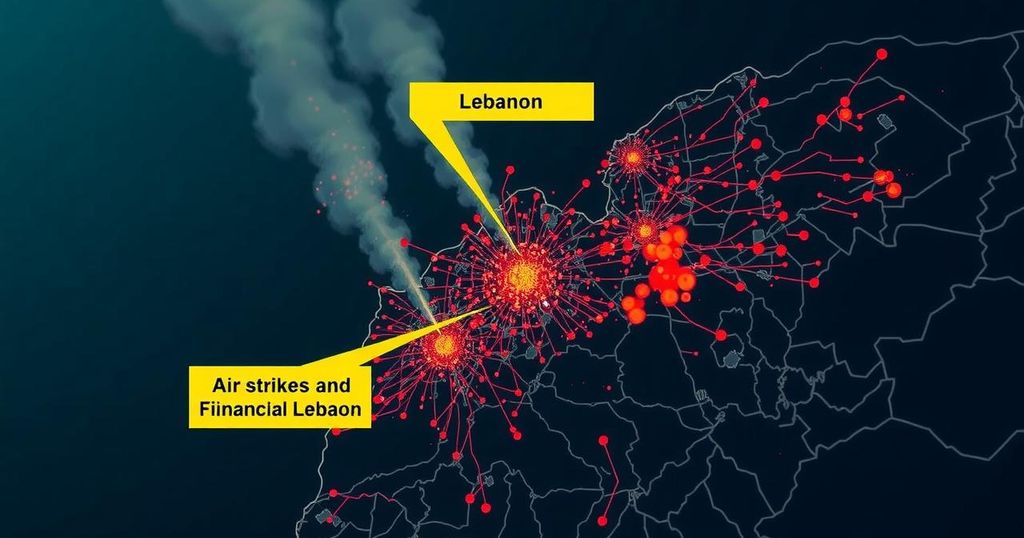Israel conducted multiple airstrikes across Lebanon targeting Hezbollah’s financial operations, specifically those of Al-Qard Al-Hasan, amidst ongoing military exchanges along the Lebanese-Israeli border. Casualties remain unreported as the conflict escalates, impacting humanitarian conditions in Gaza and prompting discussions for a potential ceasefire.
Israel has initiated a series of airstrikes across Lebanon, targeting the financial operations of Hezbollah, an Iran-backed militant group. These strikes, which included locations in the capital city of Beirut, came as a response to Hezbollah’s missile attacks on Israeli positions. The targeted financial entity, known as Al-Qard Al-Hasan, is believed to be involved in Hezbollah’s financial dealings; it has faced U.S. sanctions since 2007 for its role in facilitating these operations amidst Lebanon’s ongoing economic crisis. As explosions reverberated throughout the city on Sunday evening, there were no immediate reports of casualties. In the ongoing conflict, Israeli forces engaged in intense exchanges of fire with Hezbollah militants along the Lebanese border. Reports indicated that Hezbollah launched missile attacks on Israeli military targets and the city of Safed. The Israeli Defense Forces (IDF) retaliated by striking military and intelligence sites. Concurrently, the humanitarian situation in Gaza remains dire, as rescuers have faced challenges navigating continuous bombardment, following an Israeli airstrike that resulted in significant civilian casualties in the Gaza Strip. Moreover, discussions have been initiated concerning a ceasefire and hostage negotiations, with Ronen Bar, head of the Israeli internal security agency Shin Bet, traveling to Egypt to meet on this sensitive matter. The toll of the ongoing conflict stands at over 42,603 reported deaths in Gaza and 2,448 in Lebanon, underscoring the severe humanitarian impact of hostilities in the region. Amidst these developments, Iran is confronted with increased vulnerability due to assaults on its allied groups. While Iranian state media have been proactive in showcasing military strength, there lies an underlying crisis for Iran with regards to its regional influence. The ongoing conflict seems set to destabilize its economy further and challenge its internal political cohesion.
The conflict between Israel and Hezbollah is rooted in historical tensions and geopolitical dynamics, primarily influenced by the broader Israeli-Palestinian conflict and Iranian involvement in Lebanon. Hezbollah, designated as a terrorist organization by several nations, maintains significant military capabilities and has long been supported by Iran, complicating the regional power dynamics. Economic hardships in Lebanon, exacerbated by corruption and mismanagement, have led to a reliance on groups like Hezbollah, which provide social services. Tension has escalated in recent years, leading to increased military exchanges and airstrikes as Israel seeks to dismantle operations that fund Hezbollah and mitigate its influence.
In summary, the recent Israeli airstrikes across Lebanon signify heightened military tensions aimed at disrupting Hezbollah’s financial operations and capabilities as retaliatory actions continue on both sides of the border. The ongoing conflicts not only bring immediate military concerns but also pose severe humanitarian challenges across the region, especially in Gaza. With discussions for a ceasefire underway, the outcomes of these negotiations remain critical in addressing the casualties and restoring some sense of stability in the volatile area.
Original Source: www.washingtonpost.com






